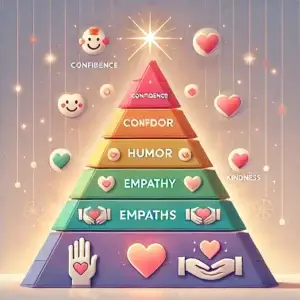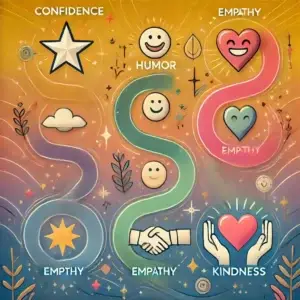
Key Traits That Capture Female Hearts: From Confidence to Kindness
 Introduction
Introduction
In a world where relationships are often superficial and fleeting, understanding the traits that genuinely resonate with women can be the key to establishing lasting connections. From kindness confidence, several essential qualities emerge as paramount in capturing female hearts. This article delves deep into these traits, offering insights, real-world examples, and actionable tips to enhance personal charisma and create profound emotional connections. Whether seeking love, friendship, or even professional relationships, embracing the key traits outlined in this article will elevate your interactions and foster deeper bonds. Understanding what truly captures a woman’s heart is not about mastering superficial tricks but cultivating genuine traits that foster connection, respect, and admiration. Like anyone else, women are drawn to authenticity, emotional depth, and certain key characteristics that reflect compatibility and shared values. Let’s explore these traits, diving deep into their pivotal role in creating meaningful relationships.
Identifying Common Traits in Men Who Attract Women
Attracting women isn’t about superficial tactics or fleeting charm—it’s about embodying traits that resonate deeply with values, emotions, and personal compatibility. Men who naturally attract women often share certain qualities that make them stand out. These traits go beyond physical appearance, tapping into emotional intelligence, confidence, and character.
Here’s a closer look at the common traits in men who attract women and why they are so appealing:
1. Confidence: Self-Assured and Secure
Confidence is universally attractive because it signals self-worth and stability. A confident man knows who he is, what he wants, and doesn’t seek constant validation.
- How It’s Demonstrated: Making decisions without hesitation, maintaining eye contact, and expressing thoughts clearly without arrogance.
- Why It Works: Confidence creates a sense of security, making women feel safe and valued in the relationship.
2. Emotional Intelligence: Understanding and Empathy
Men who can understand and manage their emotions—and empathize with others—are more likely to form deeper connections.
- Key Aspects of Emotional Intelligence:
- Active listening without interrupting.
- Validating feelings rather than dismissing them.
- Navigating disagreements calmly and respectfully.
- Why It Works: Emotional intelligence fosters trust, understanding, and a sense of being emotionally supported.
3. Ambition and Purpose: Driven and Goal-Oriented
Ambition reflects a desire for growth and improvement, which can be highly attractive. Women often appreciate men with a clear sense of purpose, whether in their career, personal goals, or passions.
- How It’s Displayed:
- Setting and pursuing meaningful goals.
- Showing discipline and focus in achieving aspirations.
- Why It Works: Ambition signals motivation and reliability, qualities that suggest long-term compatibility and stability.
4. Humor: Lighthearted and Fun
A good sense of humor can lighten stressful moments and make life more enjoyable. Women often find men with a playful, witty demeanor irresistible.
- How It’s Expressed:
- Laughing at oneself when appropriate.
- Making others laugh without being offensive.
- Finding humor even in challenging situations.
- Why It Works: Humor creates shared moments of joy, strengthens bonds, and eases tension in relationships.
5. Kindness: A Genuine Heart
Kindness is a timeless quality that signifies warmth, compassion, and a nurturing nature. Men who display genuine kindness tend to build stronger emotional connections.
- Acts of Kindness Include:
- Small gestures like holding doors open.
- Offering help without expecting anything in return.
- Showing consideration for others’ needs and feelings.
- Why It Works: Kindness signals emotional maturity and a commitment to building a healthy, balanced relationship.
6. Physical Presence: Grooming and Body Language
While physical appearance may catch the eye initially, how a man carries himself is far more impactful.
- Key Aspects of Physical Presence:
- Maintaining good hygiene and dressing appropriately.
- Confident body language—standing tall, making eye contact, and smiling genuinely.
- Why It Works: A well-maintained physical presence reflects self-respect and attentiveness to detail.
7. Respect: Valuing Others’ Boundaries and Opinions
Respect is foundational to any healthy relationship. Men who treat women as equals and honor their individuality stand out as true partners.
- How It’s Expressed:
- Listening without judgment.
- Supporting her goals and aspirations.
- Avoiding controlling or dismissive behavior.
- Why It Works: Respect fosters mutual trust and admiration, paving the way for a balanced and fulfilling partnership.
8. Open-Mindedness: Welcoming Diversity of Thought
Open-minded men are willing to explore new ideas, respect differing opinions, and embrace change.
- Why It Works: Flexibility and adaptability in thinking create an inclusive and harmonious relationship dynamic.
9. Loyalty: Commitment and Consistency
Loyalty is one of the most desirable traits in a partner. It signifies reliability, trust, and emotional investment.
- How It’s Shown:
- Being honest and transparent.
- Following through on promises.
- Standing by her side during challenging times.
- Why It Works: Loyalty strengthens the foundation of a relationship, making it resilient to challenges.
10. Authenticity: Genuine and Real
Pretending to be someone you’re not is unsustainable. Authentic men attract women by being true to themselves and honest about their feelings.
- How It’s Expressed:
- Sharing vulnerabilities and personal stories.
- Maintaining consistent behavior across different situations.
- Why It Works: Authenticity builds trust and creates a deeper, more meaningful connection.
Case Study Examples
If you’re interested in seeing how these traits play out in real-life scenarios, check out this article on PsyForU for detailed case studies and insights into the psychology behind relationships. Learn how understanding and cultivating these qualities can transform your connections and create lasting bonds.
These traits show that attraction isn’t about fleeting moments or tricks—it’s about genuine growth, emotional connection, and shared respect. By embodying these characteristics, you pave the way for deeper, more fulfilling relationships.
Table: Traits Breakdown
| Trait | Description | How it Captures Hearts |
|---|---|---|
| Confidence | Assurance in one’s abilities and experiences | Attracts attention, promotes trust, facilitates communication |
| Kindness | Genuine regard for others and their feelings | Fosters emotional connection, cultivates trust, and ensures safety |
| Humor | Ability to provide laughter and lightness | Creates joy and removes tension, making relationships enjoyable |
| Honesty | Transparency and integrity in communication | Builds trust, encourages vulnerability, and deepens emotional ties |
| Emotional Intelligence | Awareness of one’s emotions and those of others | Enhances communication, creates empathy, and fosters stronger bonds |
Here are case studies illustrating how key traits such as confidence, kindness, emotional intelligence, and loyalty can captivate and strengthen connections. Each example highlights real-life scenarios to provide deeper insights into these qualities’ transformative power in relationships.
Case Study 11: Confidence in Action
Scenario:
Ethan, a 32-year-old software developer, had struggled with self-doubt after a failed startup. He met Claire, a marketing executive, at a networking event. Instead of hiding his past failures, Ethan confidently shared his experience, what he learned, and his vision for the future.
Outcome:
Claire found Ethan’s openness and determination attractive. His confidence in owning his journey, despite setbacks, demonstrated resilience and self-awareness. Their relationship blossomed as Claire admired his courage to embrace challenges.
Lesson Learned:
Confidence isn’t about being perfect—it’s about authenticity and self-assurance in the face of imperfections.
Case Study 12: Kindness Strengthens the Bond
Scenario:
Sophia, a 28-year-old nurse, met Ryan, a graphic designer, during a community volunteer event. Over time, Ryan’s consistent acts of kindness—helping her organize medical drives and supporting her passion for healthcare—stood out. Once, when Sophia was overwhelmed by her work, Ryan surprised her with a homemade dinner and words of encouragement.
Outcome:
Sophia felt valued and emotionally supported. Ryan’s kindness showed her that he genuinely cared about her well-being, creating trust and emotional safety.
Lesson Learned:
Kindness, expressed through small, thoughtful gestures, builds emotional intimacy and trust.
Case Study 13: Emotional Intelligence Rescues a Relationship
Scenario:
Lila and Jason had been dating for two years but faced frequent arguments over communication gaps. During a conflict about Jason’s long work hours, Lila felt unheard. Jason decided to improve his emotional intelligence by taking active listening workshops and practicing empathy.
Outcome:
The next time a disagreement arose, Jason listened to Lila’s feelings without interrupting, validated her concerns, and shared his perspective calmly. This shift helped them resolve the issue and strengthened their bond.
Lesson Learned:
Emotional intelligence fosters understanding, minimizes conflicts, and deepens relationships by prioritizing empathy and effective communication.
Case Study 14: Humor Creates Lasting Memories
Scenario:
Emma, a journalist, and Alex, a schoolteacher, met on a blind date. Emma was initially nervous, but Alex’s witty humor and playful anecdotes helped her relax. During their subsequent dates, Alex continued to use humor to ease tension and turn awkward moments into shared laughter.
Outcome:
Emma appreciated how Alex’s humor created a lighthearted atmosphere, making their time together enjoyable and memorable. Their mutual laughter became a key ingredient in their growing connection.
Lesson Learned:
Humor isn’t just about jokes; it’s about creating shared moments of joy and breaking down barriers in relationships.
Case Study 15: Loyalty in Tough Times
Scenario:
Mia and David had been married for five years when Mia lost her job due to downsizing. The financial strain caused stress, but David reassured Mia of his unwavering support. He took on extra work and helped her network for new opportunities.
Outcome:
Mia regained her confidence, found a better job, and appreciated David’s loyalty during one of her lowest moments. His actions deepened her trust and respect for him.
Lesson Learned:
Loyalty is proven during challenges, solidifying trust and strengthening the foundation of a relationship.
Case Study 16: Ambition Inspires Growth
Scenario:
Olivia, a university student, started dating Marcus, a budding entrepreneur. Marcus’s ambitious mindset and disciplined approach to building his business inspired Olivia to set higher goals for herself. They supported each other’s dreams, sharing resources and celebrating milestones together.
Outcome:
Their mutual drive and encouragement helped both succeed in their respective fields, deepening their partnership.
Lesson Learned:
Ambition is attractive when coupled with support and teamwork, creating a dynamic where both partners grow together.
Case Study 17: Respect Cultivates Equality
Scenario:
Zara and Ethan had differing career paths—Zara was a travel blogger, while Ethan worked a corporate job. While their lifestyles sometimes clashed, Ethan respected Zara’s choices, encouraging her to pursue her passion without pressuring her to conform to his routine.
Outcome:
Zara felt empowered and appreciated Ethan’s respect for her independence. Their mutual understanding fostered a harmonious relationship despite their differences.
Lesson Learned:
Respecting a partner’s individuality and decisions promotes equality and prevents resentment.
Explore the Psychology of Relationships Further
Understanding traits like confidence, kindness, and emotional intelligence isn’t just about creating love stories; it’s about nurturing meaningful connections. For more case studies and insights into relationship dynamics, visit PsyForU. Their articles dive deep into the psychology of relationships, offering research-backed tips and strategies for personal growth and healthy partnerships.
By analyzing these examples, we see how genuine qualities build trust, admiration, and long-lasting bonds—proving that love is as much about personal growth as it is about connection.
Conclusion
Attracting women isn’t about playing games or adopting superficial behaviors—it’s about cultivating meaningful traits that resonate deeply on emotional, intellectual, and interpersonal levels. Confidence, kindness, emotional intelligence, respect, and authenticity are cornerstones of lasting connections. These traits not only attract women but also form the foundation of healthy, fulfilling relationships.
The key lies in striving for self-improvement while staying true to who you are. Genuine attraction comes from creating emotional safety, fostering trust, and showing respect for individuality. By embodying these qualities, men can build relationships that go beyond surface-level appeal, leading to deeper connections and long-term compatibility.
For more insights on building meaningful relationships, improving emotional intelligence, and exploring the psychology of attraction, visit PsyForU. Their expert articles and case studies offer valuable guidance on navigating the complexities of modern relationships with confidence and authenticity.
Remember, the most compelling trait of all is being the best version of yourself—and sharing that with someone who truly values it.
From confidence to kindness, the journey to capturing a woman’s heart is layered with traits that promote deeper connections and mutual respect. While confidence draws individuals in, kindness solidifies those connections, creating a nurturing environment where love can flourish. By embodying these key traits, anyone can enhance their relationships and foster meaningful interactions.
Motivational Takeaway
As you embark on your journey to cultivate these essential traits, remember that every small act of confidence or kindness has the potential to create ripples of positivity in the lives of those around you. Embrace the power of confidence and kindness, for they are the key to unlocking genuine, lasting relationships that can endure the test of time.
FAQs: Key Traits That Capture Female Hearts
1. How can I become more confident?
Answer: Building confidence involves regular self-reflection, skill development, and stepping outside of your comfort zone. Engage in activities that make you feel fulfilled and proud, and practice positive self-affirmations daily. Confidence is a skill that can be developed with intentional effort and practice. It stems from self-awareness, competence, and a positive mindset. Here’s a step-by-step guide to help you build genuine confidence:
1. Understand Confidence
Confidence is not arrogance or perfection. It’s the belief in your ability to face challenges, take action, and grow. Recognize that it’s okay to feel uncertain at times; true confidence comes from pushing forward despite doubts.
2. Develop Self-Awareness
Understanding your strengths, weaknesses, values, and passions lays the foundation for authentic confidence.
- Action Steps:
- Reflect on past successes and what contributed to them.
- Write down your achievements, no matter how small, to remind yourself of your capabilities.
- Identify areas where you lack confidence and pinpoint the root causes (e.g., fear of failure, lack of knowledge).
3. Set Achievable Goals
Confidence grows through accomplishment. Start with small, realistic goals and gradually take on bigger challenges.
- Example: If public speaking intimidates you, start by speaking in small groups before moving to larger audiences.
4. Focus on Skill Development
Competence breeds confidence. Identify areas where you want to improve and invest time in learning and practice.
- Action Steps:
- Take courses, read books, or find mentors in areas where you want to excel.
- Regularly practice skills to build proficiency and comfort.
5. Practice Positive Self-Talk
Your inner dialogue has a powerful impact on your confidence. Replace self-doubt with affirmations and constructive thoughts.
- Action Steps:
- Catch and challenge negative thoughts like “I can’t do this” with affirmations such as “I am capable of learning and improving.”
- Visualize success in challenging situations to build a positive mindset.
6. Step Outside Your Comfort Zone
Confidence grows when you face your fears and take risks. Each time you try something new or challenging, you expand your comfort zone and boost your belief in yourself.
- Example: If social situations make you nervous, practice initiating conversations in low-pressure settings.
7. Surround Yourself with Supportive People
Your environment plays a critical role in shaping your confidence. Surround yourself with positive, encouraging people who inspire and support your growth.
- Action Steps:
- Seek mentors or peers who model the confidence you want to develop.
- Limit time with those who consistently bring negativity or doubt into your life.
8. Take Care of Your Appearance and Health
Feeling good physically often translates to feeling good mentally. Simple improvements in grooming, posture, and health can significantly enhance self-esteem.
- Action Steps:
- Dress in a way that makes you feel confident and comfortable.
- Exercise regularly to boost endorphins and improve your physical and mental health.
9. Learn to Handle Criticism
Confident people view feedback as an opportunity for growth rather than a personal attack.
- Action Steps:
- Separate constructive criticism from unnecessary negativity.
- Reflect on feedback and use it to improve without letting it affect your self-worth.
10. Celebrate Progress
Recognize and celebrate small victories along the way. Acknowledging your growth reinforces confidence and keeps you motivated.
- Example: After completing a challenging task, take a moment to reflect on how far you’ve come and reward yourself.
11. Adopt a Growth Mindset
View challenges as opportunities to learn and grow. A growth mindset helps you see failure not as a reflection of your worth but as a stepping stone toward success.
- Action Steps:
- Replace “I can’t” with “I can learn how to.”
- Embrace challenges as opportunities to stretch your abilities.
12. Seek Expert Guidance
For deeper exploration, consider therapy or coaching to uncover and address confidence barriers. Resources like PsyForU provide valuable insights into building self-esteem and overcoming insecurities. Articles on mindset, personal growth, and emotional resilience can guide your journey.
Key Takeaway
Confidence is built through small, consistent actions over time. It’s about embracing challenges, learning from failures, and celebrating your growth. By investing in yourself and focusing on progress, you’ll develop the inner strength to face life’s challenges with self-assurance.
The path to confidence is personal, but every step you take moves you closer to becoming the best version of yourself.
2. Why is kindness important in relationships?
Answer: Kindness nourishes relationships by fostering emotional connections and creating a safe space for vulnerability. It encourages trust and loyalty, making individuals feel valued and secure. Kindness is often considered the glue that holds relationships together. It fosters trust, connection, and emotional safety, creating a foundation for long-lasting bonds. Here’s an in-depth exploration of why kindness is crucial in relationships:
3. Can too much kindness be a weakness?
Answer: While kindness is vital, it is essential to maintain boundaries. Being assertive and self-aware allows you to show kindness without compromising your needs or well-being.
4. How do confidence and kindness work together?
Answer: Confidence attracts others to you, while kindness retains their interest. A balance of both ensures a healthy relationship dynamic that nurtures growth and satisfaction.
5. What are some examples of acts of kindness I can practice?
Answer: Acts of kindness can include simple gestures like complimenting someone, helping a friend in need, volunteering, or reaching out to check on loved ones. Small actions can create significant impacts.
Ultimately, the journey from confidence to kindness is continuous and deeply rewarding. Embrace these key traits, and watch as they transform your interactions and relationships into something special.










